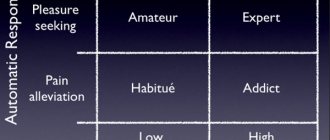Many people easily wake up only on weekends. Having slept thoroughly, on Saturday and Sunday they get out of bed fresh and full of energy. On weekdays, as a rule, it takes them quite a long time to finally wake up and feel invigorated.
Difficulty waking up is a very common sign of sleep disorders. However, not every case when a person has difficulty getting out of bed indicates the presence of a disease.
If you have difficulty getting up in the morning and you suspect you have sleep disorders, contact us at the Center. We will help you effectively! Make an appointment by phone: +7.
How long should healthy sleep last?
The human brain needs daily rest. While a person sleeps, his brain processes the information received during the day, neural connections are formed, and logical chains are formed. In addition, during sleep, the brain takes a break from endlessly incoming information. He gets the opportunity to protect himself from external irritants, stress, and restore his strength.
On average, every person needs 7-8 hours of sleep daily to feel rested, alert and full of energy. During this time, the brain will have time to process all the information received during the day, which means it will be able to correctly perceive new data.
The idea that more hours of sleep will give you more strength is wrong. If you sleep more than 10 hours, the risk of developing cardiovascular diseases, diabetes, metabolic disorders and many other health problems increases.
What can influence the need for long sleep
When 8 hours is not enough to get enough sleep and recharge your batteries, you need to pay attention to certain signals from the body. So it can signal:
- overwork;
- dysfunction of the thyroid gland;
- heart diseases;
- course of an infectious disease;
- malnutrition or overeating;
- neurological abnormalities;
- constant stress or depression;
- night apnea.
In addition to disturbances in the functioning of the body, a constant state of lack of sleep can provoke the use of certain medications, especially sedatives.
Consequences of the problem
This condition is undesirable for a person and carries with it a number of negative effects. First, there will be a change in processes such as concentration and performance. We will make mistakes due to inattention, hesitations in speech, we may get into an accident, drive through a station, we may read, but not understand what we have read. This is a dysfunction.
The next thing is a change in emotional state. We become irritable, touchy, women become tearful, some changes in behavior occur, for example, you can overeat during the day.
And thirdly, our victimization increases when we become exposed to the risks that we will be deceived, that we will be provoked into something, that we will be vulnerable under the influence of others.
Drowsiness as a diagnosis
If a person constantly wants to increase the duration of daily sleep, this may indicate that he has idiopathic hypersomnia. This is a condition in which the nervous system does not work properly, causing a person to feel constantly tired, even after a night's sleep. Hypotension is often simultaneously observed, accompanied by dizziness and migraines.
Experiencing constant drowsiness, a person cannot concentrate on an important task, he fails to perform the assigned tasks efficiently. Idiopathic hypersomnia makes a person an introvert, because in a state of constant fatigue one does not want to make new acquaintances, participate in meetings with friends, go on visits and actively spend time in company.
Chronic lack of sleep also has more dangerous consequences. This is especially true for drivers. When driving, you must always be ready to make important decisions in a matter of seconds. Idiopathic hypersomnia will not allow this to be done, because this condition greatly inhibits the reaction, which often causes fatal accidents.
Sources of the problem
Research has proven that there are many factors that lead to this condition. For example, such diseases:
- Rheumatism and asthma
- Digestive disorders and chronic alcoholism
- Mental illness and narcolepsy
- Snoring and apnea
- Restless legs syndrome and insomnia
- Prostatitis and nocturnal shortness of breath
- Epilepsy and arthritis
With such illnesses, it is difficult for a person to relax. In addition, sleep may be disrupted due to excessive mental or physical fatigue, due to strong emotions or shock, due to misunderstanding and drastic changes in life. Disorders of this type are dictated by both the flu and previous surgery.
What are the dangers of long sleep?
The first thing that long duration sleep affects is the cardiovascular system. This is due to the fact that during certain stages of sleep, the heart rate slows down significantly. This was proven thanks to the advent of 24-hour monitors worn by patients in cardiology departments. Between 4 and 5 a.m., the vast majority of patients experienced a period when their heart rate slowed to 40 beats per minute, which is half normal. Prolonged sleep causes the brain to enter a phase with a low heart rate several times. A frequent decrease in heart rate provokes the development of a predisposition to heart attacks and strokes.
Number two on the list of disorders caused by long hours of sleep is obesity. Metabolic processes must actively distribute nutrients from the gastrointestinal tract to organs and tissues, while simultaneously burning carbohydrates to provide energy for physical and mental activity. Constant rest slows down your metabolism. The hormone melatonin, which is actively produced during sleep, makes its own adjustments to the functioning of internal organs. Metabolic processes direct glucose not to be processed into energy, but into subcutaneous and visceral fat. As a result, the organs become overgrown with adipose tissue, and the figure takes on a baggy appearance.
Diabetes, both type 1 and type 2, is a common problem for those who sleep more than 9 hours a night. This is directly related to the hormonal background of a sleeping person. The production of some hormones decreases, while others increase during sleep. Insulin is a hormone responsible for the metabolism of sugars. During sleep, the body produces much less of it than is required. Spending more than a third of the day sleeping increases the risk of diabetes.
Difficulty waking up as a sign of sleep apnea syndrome
Sometimes the cause of problems with awakening is somewhat unexpected for the patient. It consists of... snoring, and not just snoring, but in its complicated form - obstructive sleep apnea syndrome.
With this disease, the patient has snoring and sleep apnea, caused by periodic closure of the lumen of the pharynx during night rest. Pauses in breathing can occur tens or hundreds of times per night. They last more than 10 seconds, and can last 1, 2 minutes or even more.
Due to frequent pauses in breathing, a person’s sleep structure is disrupted, because he constantly experiences micro-awakenings: his brain is activated to increase the tone of the muscles of the pharynx and give the sleeper the opportunity to take a breath. The number of times a person stops breathing during sleep is the number of times micro-awakenings occur. As already mentioned, their number can reach several hundred per night.
Naturally, the effect of such intermittent sleep is small: in the morning a person does not even remember how restlessly he slept at night, but he wakes up with great difficulty and experiences drowsiness throughout the day.
Sleep apnea syndrome is not just unpleasant symptoms. In addition to snoring and drowsiness, the patient experiences other symptoms that appear due to constant oxygen deprivation during sleep. The patient develops heart disease faster, the risk of heart attack and stroke increases 3-5 times, he suffers from attacks of night shortness of breath, cough, heartburn, impotence, heart rhythm disturbances, high blood pressure, frequent urination and other disorders of many organs and systems If you suspect you have this condition, get tested to help determine if you have cause for concern.
The disease is dangerous, but there is a very effective treatment - CPAP therapy. After the examination, the somnologist will select the necessary treatment and its regimen.
The Rehabilitation Clinic in Khamovniki has a special program for the diagnosis and treatment of snoring. You can also go for an outpatient consultation, during which a specialist will determine the next steps.
How to determine whether correction of sleep duration is needed
The normal sleep duration of 7-8 hours, on the one hand, should be taken as the basis for developing your own daily routine. On the other hand, these numbers are not a general rule, because each organism is individual. Some people may need 9-10 hours a day to regain their strength. It should be remembered that the described sleep duration norms apply only to adults, because for children these values are much higher: from 20 to 12 hours, depending on age.
To understand whether sleep lasting more than 8 hours is physiologically normal, you need to undergo examinations. First of all, you need to independently analyze whether you have taken sedatives or other medications, the side effects of which include drowsiness. Stopping taking these medications should eliminate the constant desire to sleep.
After a simple self-analysis, you can seek help from doctors. They will monitor your sleep, study your blood composition and heart function. If the causes of drowsiness are found, eliminating them will restore good spirits after 7 hours of sleep. The result of the examination may be a conclusion confirming the need to sleep longer than 7-8 hours, due to the physiological characteristics of the body.
Polyphasic sleep: a way out of the situation or self-deception?
For a person who has a normal need for sleep, but wants to get enough sleep in 4 hours, the only way to realize his idea is to switch to polyphasic sleep.
Of course, you can simply limit your nightly sleep to 4 hours, but practice shows that you can sleep for that long, but it’s unlikely to get enough sleep. A few days - and it will end with falling asleep at the most unexpected moment - for example, falling asleep at the workplace with profuse drooling on the computer keyboard. Or passing out at lunch and getting burns on your face from soup - who knows where you will succumb to the spell of sleep!
And polyphasic sleep is, although not a panacea, but at least a hope for the preservation of performance and mental processes. There have been no official studies of polyphasic sleep (and sleep specialists do not recommend its use!), but there are people who practice this practice. Several polyphasic sleep modes have even been proposed.
Dymaxion mode a person sleeps for half an hour every 6 hours.
U berman mode : sleep every 4 hours for 20 minutes. Leonardo da Vinci used approximately this technique in his time - however, it is believed that he slept more often and for 15 minutes.
E veryman mode : sleep for 1.5-3 hours at night, during the day - 3 times at equal intervals of 20 minutes.
Tesla mode : 2 hours at night, 20 minutes during the day.
Siesta mode : 5 hours at night and 1.5 hours during the day.
Many people who want to learn how to get enough sleep quickly choose and put into practice their favorite schemes. The Internet is full of communities, groups, websites, discussions dedicated to polyphasic sleep and gathering its followers, sharing experiences and successes.
Do they manage to sleep 4 hours and get enough sleep? Often yes. People achieve the greatest success in the “one night sleep and one day sleep” pattern. Moreover, they do not necessarily follow the minute-by-minute schedule of the above modes; sometimes lovers of the polyphasic sleep technique simply sleep for 1.5-2 hours at night and during the day.
This is quite logical. 1.5-2 hours is the duration of one sleep cycle. After this time, the person is in the phase of light sleep, at the moment when it is easiest for him to wake up and move to an alert state, which will last for several hours. If you then sleep for the same amount of time, it helps to get another boost of energy. Thus, gradually “interrupting” with small portions of sleep, a person leads an acceptable existence.










